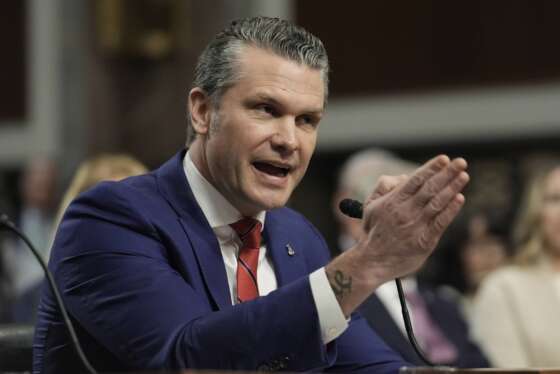
DoD’s longest-serving employee marks 75 years in government
Sarkis Tatigian, 94, just marked his 75th anniversary as a Navy employee, but says he has no immediate plans to retire.
Subscribe to On DoD interviews on iTunes or PodcastOne.
Some federal employees are counting the days until they’re able to retire and 30 percent of the workforce are already retirement-eligible, and then there’s Sarkis Tatigian.
He has been retirement eligible since October 1973 — longer than many feds have been alive — and just marked his 75th anniversary of federal service, all of it in the Department of the Navy and most of it advocating for small businesses.
According to Defense Department records, he is the department’s longest-serving employee and the only World War II veteran still working for the federal government. Navy officials say they believe he’s actually the only WWII vet in federal service, period, but the Office of Personnel Management doesn’t have records that go back far enough to say for sure.
Tatigian, 94, began his government career in 1942 when he enlisted in the Navy, where his first assignment was as a radio inspector at the now-defunct Philadelphia Naval Shipyard.
“I guess I was picked out because I knew the difference between an ohm and a volt,” he said in an interview.
From there, he went on to what was then called the Bureau of Ordnance, which, several Navy reorganizations later, is now part of Naval Sea Systems Command. That’s where Tatigian works now, as NAVSEA’s associate director in its Small and Disadvantaged Business Utilization Office.
He’s held that same title since 1979, but insists he’s never gotten bored or restless. He’s only taken one vacation day so far this year.
“In my case, it’s the variety of work. Every day is like getting a new job,” he said. “The situations that arise, the problems that arise, the people that you talk to are on the phone or in the office or in the business world. That’s probably the driving force: the variety, instead of being on an assembly line to tighten a screw or a bolt or something all day.”
Notwithstanding his stint as a 19-year-old radio inspector, Tatigian has spent virtually his entire career as a small business advocate, starting in 1951, two years before Congress created the Small Business Administration and before most agencies had anything resembling a small business program.
Tatigian says the ordnance bureau was just beginning to construct one of the federal government’s first small business programs, part of an effort to preserve some of the industrial capacity that had been built during the war and prevent too much defense manufacturing from being consolidated within large firms. He was hired as the junior employee in what was then a two-man office.
Since there was no playbook for what a small business office should do, Tatigian’s boss landed on the idea of sending him on a cross-country tour with a mobile exhibit showcasing the various types of military equipment small businesses were capable of producing.
“We went to the capital of every state and all cities that had a population of over 400,000, and I’m the one that had to put all of this together by myself,” he said. “We had many mayors visiting the exhibit, many governors — Gov. Earl Warren for one, who later became a Supreme Court justice. It was quite a sensation of publicity, and the cost of the trip was more than offset by the interest we raised in companies who could produce these products.”
But throughout his career, Tatigian says he’s seen his job as not just promoting small businesses to government customers, but convincing those firms that the bureaucracy involved in doing business with the federal government is worthwhile.
The worries some defense officials and members of Congress have been expressing of late about “non-traditional” firms being averse to government work are nothing new, he said.
“It’s always been a challenge,” he said. “Many companies feel that way about doing government work. It’s complicated and so forth, but there’s enough people in the government, whether it’s in my capacity, in the Small Business Administration, or procurement and technical activities in the field that are funded by the government to advise these companies what to do, how to do it and be able to go after the opportunities that are available for setting up their businesses and becoming successful.”
Tatigian said his best advice to incoming federal employees is to find an area of specialization and become an expert at it, rather than attempting to be an “all-around person.”
As for himself, he says he has no immediate plans to retire.
“But no one can last forever, and no one is irreplaceable either,” he said. “So it is something we’re thinking of more and more.”
Copyright © 2025 Federal News Network. All rights reserved. This website is not intended for users located within the European Economic Area.
Jared Serbu is deputy editor of Federal News Network and reports on the Defense Department’s contracting, legislative, workforce and IT issues.
Follow @jserbuWFED






